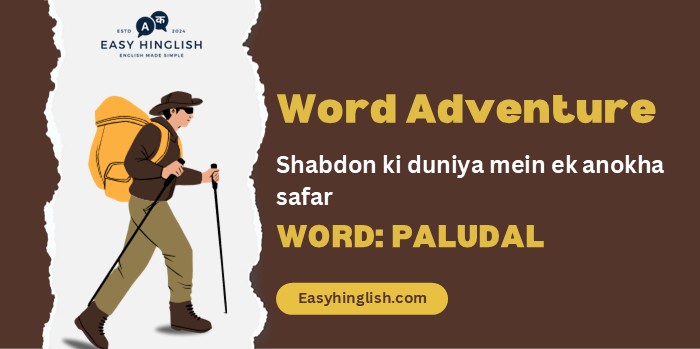Word Adventure: Paludal
The Headline
“Paludal: Earth Ke Mysterious Marshlands Ka Linguistic Gateway”
The Scoop
Ecological aur geological terms ki rich vocabulary mein, kuch words humein directly specific landscapes tak le jaate hain apni sounds aur origins ke saath. ‘Paludal’ ek aisa evocative term hai – ek adjective jo humein immediately marshes, swamps, aur bogs ki misty, teeming world mein transport kar deta hai. Aaj, hum is specialized lekin vivid word explore karenge jo scientists, writers, aur nature enthusiasts ko wetland environments aur unke sustain kiye jaane wale life ki distinctive characteristics describe karne mein help karta hai.
Let’s Break It Down
The Plot Thickens
‘Paludal’ humein directly Latin roots se aata hai, jahan “palus, paludis” marshes aur swamps refer karta tha. Is same Latin root ne humein related terms diye jaise “paludism” (malaria ka old term, jo swamp air se associated tha) aur “paludification” (woh process jisse land marsh mein transform hoti hai).
While everyday conversation mein nahi, ‘paludal’ scientific literature mein ek precise aur useful term remain karta hai, particularly ecology, geology, aur environmental studies mein. Yeh researchers ko specifically describe karne allow karta hai organisms, processes, ya formations jo marsh environments se related hain as distinct from other aquatic ya terrestrial settings.
Jo ‘paludal’ ko particularly valuable banata hai woh yeh hai ki yeh wetlands ki growing recognition se connect karta hai ecological importance ke. Once dismissed as wastelands jo drain aur “improve” kiye jaane the, hum ab marshes, swamps, aur bogs ko biodiversity hotspots, carbon sinks, aur flooding against essential buffers ki tarah understand karte hain. In environments surrounding specialized vocabulary, including ‘paludal’, unki distinctive characteristics aur value articulate karne mein help karti hai.
Word in the Wild
The Twist
Yahan ek thought-provoking aspect hai ‘paludal’ ka: jo environments yeh word describe karta hai woh historically cultures across both fear aur fascination ke subjects rahe hain. Literature aur folklore mein, marshlands often liminal spaces ki tarah appear karte hain – known aur unknown worlds ke beech thresholds, danger aur transformation dono ke realms. Great Dismal Swamp se jo escaped slaves shelter deta tha lekar Japanese folklore ki marsh spirits tak, Northern Europe ke bog bodies tak jo time transcend karte lagte hain, paludal landscapes aise places ki tarah portrayed kiye gaye hain jahan normal rules suspended hote hain. Shayad in environments ke towards hamara ambivalence – simultaneously vital ecosystems aur challenging terrains – ek deeper human relationship reflect karta hai liminal spaces ke saath. Neither fully land nor fully water, paludal environments easy categorization resist karte hain, humein remind karte hue ki Earth ke most important regions boundaries aur intersections par exist karte hain rather than hamare conceptual boxes mein neatly fit hone ki.
Make It Stick
Paludal: Jab aapko fancy way chahiye yeh kehne ka “Haan, mere shoes definitely muddy ho jaayenge yahan!”
Your Turn
Kya aapne kabhi koi paludal environment visit kiya hai ya uske paas live kiya hai – koi marsh, swamp, ya bog? Kya impressions usne aap par leave kiye? Kya aapne distinctive plant ya animal life notice kiye, particular sounds ya smells, ya koi certain atmosphere jo other natural settings se different tha? Ya phir aapne marshlands ki memorable depictions literature, art, ya film mein encounter kiye hain? In unique ecosystems ke saath apne experiences comments mein share kijiye. Chaliye explore karte hain in misty, mysterious landscapes ke saath hamari collective fascination!
Down the Rabbit Hole
- Curious about different types of wetlands? Research kijiye marshes, swamps, bogs, aur fens ke beech distinctions – har ek unique hydrology, soil, aur ecosystems ke saath.
- Interested in wetland ecology mein? Look into kijiye “hydrophytic” plants, carbon sequestration mein wetlands ki role, ya bogs mein peat formation ki fascinating process.
- Marshlands par cultural perspectives explore karna chahte hain? Investigate kijiye literary works jaise “The Marsh King’s Daughter” (Hans Christian Andersen), “Where the Crawdads Sing” (Delia Owens), ya wetland regions ki folklore jaise Louisiana ke bayous ya East Anglia ke fens.
The Last Word
Jaise hi hum ‘paludal’ ki world mein apni expedition conclude karte hain, main hope karta hun ki aapko is specialized term aur jo vital environments yeh describe karta hai dono ke liye appreciation mili hai. Unki rich biodiversity se lekar unki cultural significance tak, marshlands precise aur evocative language deserve karte hain jo ‘paludal’ jaise words provide karte hain. Next time jab aap kisi wetland ke paas find karenge yourself ko – whether vast coastal marsh ho, hidden forest swamp ho, ya even small backyard bog – ek moment take kijiye uski unique characteristics observe karne ka aur remember kijiye ki aap Earth ke most productive ecological intersections mein se ek par stand kar rahe hain. Until our next word adventure, yeh hai Prashant from Wordpandit, encouraging you to occasionally beaten path se venture off karne ka aur specialized vocabulary ki linguistically rich terrain mein jaane ka!








